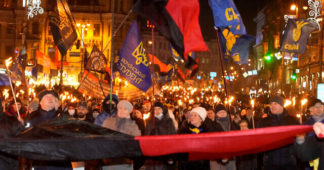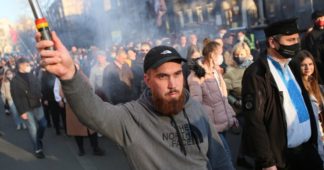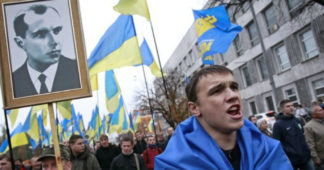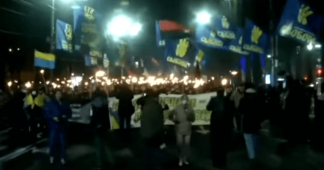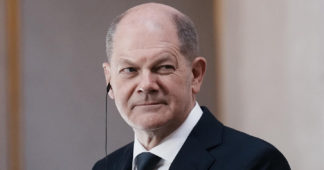By Peter Schwarz
May 12, 2023
On 8 and 9 May, Berlin traditionally hosts numerous commemorative events to mark the end of the Second World War in Europe. On these two dates, the German Wehrmacht signed the unconditional surrender in 1945 in Reims, France, and in Berlin-Karlshorst, Germany. The Nazi regime was finally crushed. Adolf Hitler had committed suicide eight days earlier.
The main burden of the struggle against Hitler’s Germany was borne by the Red Army of the Soviet Union, which defeated the Wehrmacht under immense sacrifices. At least 13 million Soviet soldiers and 14 million civilians lost their lives in the war. But at the Berlin commemorative events this year, the displaying of the Soviet flag was forbidden. The Berlin Senate called on more than 1,500 police officers to enforce the ban on the three Soviet memorials in Treptower Park, Tiergarten and Schönholzer Heide. There were more police officers than visitors.
On the other hand, it was permissible to show the Ukrainian flag, which was only used by collaborators who were deeply involved in the crimes of the Nazis during World War II. For example, the Melnyk wing of the Organization of Ukrainian Nationalists (OUN-M) used the blue-yellow flag with a trident, as it is also used today in Ukraine.
While the vast majority of Ukrainian men and women, along with their Russian and other Soviet comrades in the Red Army, fought against the Nazis, the OUN-M and the rival wing around Stepan Bandera (OUN-B) joined German SS units and participated in mass murders that claimed the lives of tens of thousands of Jews, Poles, Russians and Ukrainians.
The decision to ban the display of the Soviet flag at the commemorative events was ultimately taken by the High Administrative Court of Berlin-Brandenburg. The police originally banned both Soviet and Russian as well as Ukrainian flags and justified this on the grounds that they could provoke violence against the background of the Ukrainian war. The Berlin Administrative Court lifted this ban again on the basis of a lawsuit. At the request of the police, the High Administrative Court decided to ban only the Soviet and Russian flags and to admit the Ukrainian flag.
The political significance of this decision is unequivocal: 78 years after the defeat of the Nazi regime, it is forbidden in the German capital to show the flag of the liberators. The flag of collaborators and war criminals is welcome. A clearer commitment to the criminal policy of the Nazi regime is hardly conceivable.
This is not an isolated case or a misstep. The scandalous ban illustrates how advanced the trivialization of Nazi crimes in Germany is. Not a single significant media outlet and no established party has objected to it.
The trivialization of National Socialism is inseparable from the return of German militarism. The IYSSE already warned in 2014: “The revival of German militarism requires a new interpretation of history that trivializes the crimes of the Nazi era.” At the time, the youth organization of the Socialist Equality Party (SGP) protested against the historian Jörg Baberowski, who had defended the Nazi apologist Ernst Nolte in Der Spiegel and declared that Hitler was “not vicious.”
This warning has been confirmed in the intervening years. Even then, almost all the media, the leadership of the Humboldt University and numerous politicians supported Baberowski and denounced the IYSSE for daring to criticize the far-right professor. Close cooperation with the right-wing and fascists has since become commonplace, not only in Germany, where the far-right Alternative for Germany sits on all important parliamentary committees, but also in Berlin’s foreign policy.
In official Berlin, nobody is bothered by the fact that the German-backed and -armed Zelensky regime erects monuments for Nazi collaborators and mass murderers, names numerous streets after them, cleanses the country of Russian culture (even Alexander Pushkin and other representatives of world literature are not spared) and bans numerous left-wing parties.
In the Baltic states, too, the German government and the German army work closely together with forces that revere members of the Nazi SS as heroes.
If one follows the bellicose propaganda with which the population in Germany is daily bombarded, one gets the impression that large parts of the ruling elites deeply regretted that Hitler had not achieved his goal of conquering and destroying Moscow.
In a long commentary on 7 May, F.A.Z. journalist Konrad Schuller urged Ukraine to immediately join NATO to provide it with a “nuclear umbrella.” He warned of a “painful stalemate” if the announced offensive of the Ukrainians remains unsuccessful. The “vigilance” of the West could then weaken and “the temptation to put scarce money into other projects rather than into weapons” grows.
After NATO “had already gone out on a limb for Ukraine with material and ideological aid,” Schuller said, its solemn promises would turn out to be empty words. “The allies could then scatter like chickens when the hawk arrives.” Therefore, Ukraine must receive much more money and weapons than it does now.
Less than 80 years after large parts of Europe and Germany lay in ruins, people like Schuller are again ready to unleash a nuclear inferno to satisfy their imperialist world power fantasies.
In reality, the German ruling class has never resigned itself to the defeat of Hitler. After the end of the war, it took a full 40 years for a German head of state to refer to May 8 as “Liberation Day” for the first time. But Federal President Richard von Weizsäcker, whose father was convicted as a war criminal in Nuremberg, also added at the time: “May 8 is not a day for us Germans to celebrate.”
Today, Weizsäcker’s Christian Democratic Union posts on social media that May 8, 1945 is indeed a “day of liberation,” but “also a day of immeasurable suffering.”
Immeasurable suffering for whom, one wonders. For the surviving concentration camp inmates? For the few Jews who had escaped their murderers? For the workers who had not come to terms with the Nazis and were spied on and terrorized by the Gestapo? For the Greeks, Yugoslavs, Poles and Soviet citizens whose livelihoods and lives were destroyed by the Nazis? For the young men who were forced into uniforms and massacred at the front? Or for the fat Nazi henchmen and entrepreneurs who had enriched themselves with Aryanization and forced labor and now feared for their fortunes – which, unfortunately, remained with them.
When the historian Ernst Nolte made his first attempt to rehabilitate National Socialism in 1986, he suffered a devastating defeat in the historians’ dispute (Historikerstreit). When Baberowski defended Nolte in 2014, he was met with open arms. Today, if Nolte were still alive (he died in 2016), he would be showered with prizes.
The rehabilitation of National Socialism has objective causes. German imperialism is confronted with the same insoluble contradictions as at the beginning of the twentieth century. And it is trying to solve them with the same barbaric methods.
Imprisoned in fragmented Europe, the dynamic German economy at the beginning of the twentieth century urgently needed raw materials, investment opportunities and markets. But these were already divided among the old colonial powers. During the First World War, Germany fought against France, Great Britain and the Tsarist Empire, which was allied with France and, with its enormous territory, offered great opportunities for expansion.
But Germany lost the war. Instead of victory came the revolution, which German capitalism only survived with the help of the Social Democrats. The real winner of the war was another rising power: the United States.
The Second World War was a gigantic attempt to correct the result of the first. Germany tried to bring Europe under its rule and smash the Soviet Union in order to challenge the world power, the USA. To this end, a conspiracy around Reich President Paul von Hindenburg with the support of leading economic and military circles in January 1933 brought Adolf Hitler to power. His regime had two tasks: the violent crushing of the workers’ movement, which rejected war and militarism, and the concentration of all the country’s forces on rearmament and war.
But Germany also lost the Second World War. German capitalism survived, partly because the US needed it as a bulwark against the Soviet Union. In the post-war decades, it thrived and expanded in the slipstream of US imperialism. But that changed with the collapse of the Soviet Union. Since then, the conflicts between the imperialist powers have intensified.
The US is trying to offset its economic decline by one brutal war after another. The German government supports these wars partly openly, partly indirectly, in order to become a European leader and a world power. One day after the start of the war in Ukraine, it launched the largest rearmament offensive since 1945. Like the US, it is steadily escalating its proxy war against Russia in Ukraine and is not even shying away from nuclear annihilation.
This explains the changed view of Hitler, whose furious hatred of the Soviet Union, Marxism and the organized workers’ movement are now again gaining positive sides.
Above all, parts of the affluent urban middle class, which have enriched themselves in recent years by the stock and real estate boom, while the incomes of the workers fell, have found favor with imperialism. This explains the transformation of the Greens, which initially presented themselves as anti-fascist and pacifist, into ardent militarists.
The danger of a nuclear world war can only be stopped by an independent movement of the international working class that combines the struggle against social inequality and war with the struggle against its cause, capitalism. The same insoluble contradictions of capitalism that drive the ruling class towards war also create the conditions for the socialist revolution.
Also read
“Why minimizing the ’Red’ victory?”
We remind our readers that publication of articles on our site does not mean that we agree with what is written. Our policy is to publish anything which we consider of interest, so as to assist our readers in forming their opinions. Sometimes we even publish articles with which we totally disagree, since we believe it is important for our readers to be informed on as wide a spectrum of views as possible.
